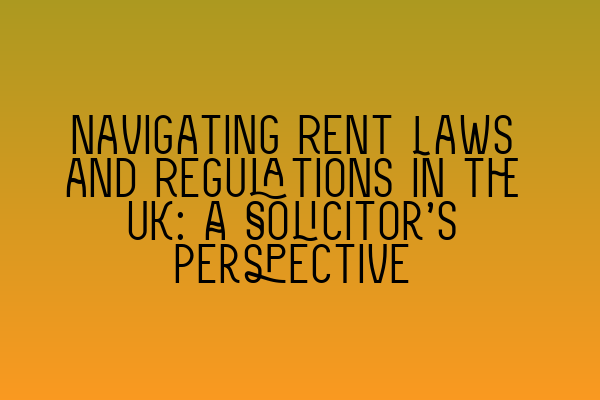Navigating Rent Laws and Regulations in the UK: A Solicitor’s Perspective
As a solicitor specializing in property and land law, I understand the complexities and challenges that both landlords and tenants face when dealing with rent laws and regulations in the UK. The rental market can be a daunting place, filled with legal jargon and ever-changing rules. In this blog post, I will shed light on important aspects of rent laws and regulations and provide valuable insights on how to navigate this landscape successfully.
Understanding Tenancy Types
Before delving into the intricacies of rent laws and regulations, it’s crucial to understand the different types of tenancies in the UK. The two main categories are assured shorthold tenancies (ASTs) and regulated tenancies. ASTs are the most common type of tenancy, giving landlords the flexibility to set the rent and regain possession of the property after providing sufficient notice. Regulated tenancies, on the other hand, offer tenants greater security of tenure and restrict landlords’ ability to increase rent.
Determining Rent and Rent Increases
Determining the appropriate rent for a property is one of the most important aspects of rent laws and regulations. Landlords must ensure that the rent charged is reasonable, taking into account factors such as market value, location, and property condition. It’s also crucial to understand the rules around rent increases. For ASTs, landlords must provide at least one month’s notice before increasing rent, while regulated tenancies have stricter regulations governing rent increases.
Tenancy Deposit Protection
Another crucial aspect of rent laws and regulations in the UK is the protection of tenant’s deposits. The law requires landlords to protect deposits in a government-approved deposit scheme within 30 days of receipt. This not only ensures that tenants’ deposits are safeguarded but also provides a fair dispute resolution process at the end of the tenancy.
Repairs and Maintenance
Both landlords and tenants have obligations regarding repairs and maintenance of rental properties. Landlords are responsible for ensuring that the property is safe and habitable, while tenants are required to report any maintenance issues promptly. It’s essential for both parties to understand their rights and responsibilities to avoid potential disputes.
Ending a Tenancy
Ending a tenancy can be a complex process, with specific rules and regulations to follow. Tenants can provide notice to end the tenancy, usually in the form of a written notice. Landlords, on the other hand, must provide a valid reason for ending a tenancy, such as non-payment of rent or breach of tenancy agreements. It’s essential to follow the correct procedure to avoid legal complications.
Professional Advice and Assistance
Given the complexities of rent laws and regulations in the UK, seeking professional advice and assistance from a solicitor specializing in property and land law is highly advisable. A solicitor can provide expert guidance on legal matters, review and draft tenancy agreements, handle disputes, and ensure compliance with all relevant regulations.
Conclusion
Rent laws and regulations in the UK can be complex and challenging for both landlords and tenants. Understanding the different types of tenancies, determining rent, protecting deposits, maintaining the property, and ending a tenancy are all key aspects to consider. Seeking advice and assistance from a solicitor specializing in property and land law can help navigate this landscape successfully.
If you found this article helpful, we also offer a range of SQE preparation courses to help you prepare for the solicitors qualifying examination. Check out our related articles below for more information:
SQE 1 Practice Exam Questions
SQE 1 Practice Mocks FLK1 FLK2
SQE 2 Preparation Courses
SQE 1 Preparation Courses
SRA SQE Exam Dates
Remember, knowledge is power, and staying informed is crucial when dealing with rent laws and regulations in the UK. Don’t hesitate to seek professional assistance to ensure that your rights are protected and your obligations are fulfilled.
